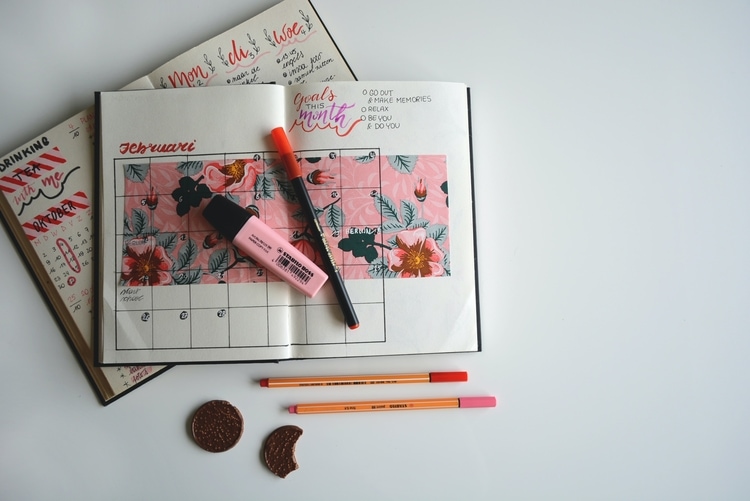In this article and video, we take a look at how you can become a more persistent language learner, and how to study languages every day by turning it into a daily habit. In less time than you think, learning a new language will become second nature!

Turn Procrastination into Enthusiasm: How to Study Languages Every Day Without Fail
Just between you and me, I was a real slacker at school. But I managed to change my ways once I dove into learning languages. You might find it hard to believe, but changing the way you study can actually be very simple. It all has to do with building habits (and sticking to them). After all, there’s nothing all that fun or exciting about brushing your teeth. And yet, it’s something we all do every day.
In fact, if you think about it, there are lots of little things we do every day out of habit. So why not learning a new language?
Procrastinators unite! …Tomorrow
When I was a student, procrastination, or “the art of putting it off ’till tomorrow,” was my specialty. Procrastination starts with imagining yourself doing the task at hand, but feeling like it’s too long, too difficult, or too boring.
All those negative thoughts lead to a sense of fear, and our first reaction is to put it off to a later time (usually tomorrow, and then tomorrow’s tomorrow, ad nauseam). As a result, you’re free of your fear and you feel better! But you also haven’t made any progress, and you’re no closer to your goals.
One of the biggest problems language learners face is the apprehension they tend to feel when it comes to studying. The best thing that you can do is to get rid of it.
How great would it be to feel enthusiastic about the idea of studying, rather than apprehensive? For that to happen, studying needs to be something positive. Something that you genuinely look forward to, rather than something that you fear and which ultimately holds you back.
Hacking your reward system
“Sounds great. But how?”
Glad you asked! No matter how much of a procrastinator someone might be, everybody feels good when they finish a task. There’s a real sense of satisfaction and pride that comes from crossing something off your list of to-dos, like sending an important email or cleaning up your room.
That sense of satisfaction comes from a surge of dopamine, one of the chemicals in your brain that’s responsible for feelings of happiness and content. Yes, studying languages every day could make you a happier person!
Dopamine is part of your brain’s “reward system,” and can be used to help you create successful habits and be more productive. Each of the four tips below is designed to help you hack your reward system and take learning from “Boo…” to “Woo!” Just think of it like getting tipsy on language learning 😉
4 Tips to Successfully Study Languages Every Day
1. Live (and learn!) in the moment
One of the most important factors when it comes to studying a language is how you choose to perceive it. You might think that studying a language is a means to an end. After all, you’re trying to learn to speak a language, and your goals are probably centered around this kind of thinking. However, it’s important to realize that simply studying at all is a big achievement in and of itself!
While it’s good to keep your goals in mind – and they can certainly be a powerful motivator – it’s also important to live in the moment and appreciate the fact that studying a language is much more than just a way of getting somewhere. Rather than waiting for the moment when you’ll be proud of, for example, having your first conversation with a native speaker, remember to appreciate each step of the journey.
You’re studying a language and sticking to it, it’s a fantastic achievement, and worth celebrating. Whether you’re using your MosaLingua app, listening to a podcast in your target language, or watching a TV series with subtitles, if you can think of studying as its own worthwhile exercise, you’ll get that hit of dopamine a lot more often, and that will help you stay motivated.
2. Keep your study sessions short and sweet
So, there you are scrolling through your phone again… You know you should probably put it down and do something productive… But you just can’t get started.
This often happens when we have a particularly long or difficult task ahead of us. But studying a language doesn’t have to be long or difficult. Contrary to learning a language in school, you have no big deadlines to meet, and you can go at your own pace.
Learning a language is a lifelong endeavor, so there’s no need to bury yourself under a mountain of work! Progress happens by practicing a little bit, frequently—not a whole lot, once in a while.
Rather than planning big, intimidating, tiring study sessions, aim to study languages every day, but only for a few minutes at a time. Ten minutes a day, six days a week is much better than 1 hour, once a week. Plus, it’s a lot easier to get started when you know your study session will be short and sweet. There are lots of ways to do it. You can learn 10 new words on your MosaLingua app, read a single paragraph of an interesting blog, or watch a short YouTube video on something you’re passionate about.
Once you’re done, remember to take a moment to appreciate the warm, fuzzy feeling of accomplishment. Pretty great for just five to ten minutes of work, right?
3. Do it on the daily
The most important part of successfully building a habit is to do the task frequently and consistently — that means you should study languages every day if you can. There are many different ways to make language learning a lifestyle, and incorporate it into your daily schedule.
With MosaLingua and other apps, you can practice anytime and anywhere, including commuting to and from work, waiting in the doctor’s office, or during a coffee break. How about all those hours spent on Facebook and Instagram? Well, turn social media from time-waster to golden opportunity!
Find ways to “sneak” studying languages into your daily routine, and it will eventually become a part of it. With the right outlook, as I said above, each exposure to your target language will give your brain a dopamine boost, and make it that much more exciting to keep at it. It’s the healthiest addiction there is!
4. Keep track of your progress
One last thing: it’s important to keep track of your work and progress, to help reinforce those feelings of satisfaction and pride. Any time you start to feel discouraged (or even just lazy…), you can look back at your progress for a boost of motivation. If you’re creative, you might want to start a bullet journal for language.
Wrapping Up
To summarize, here are four tips you can use to hack your reward system and make language learning a daily habit:
- Enjoy the journey and celebrate the fact that any time spent learning your language is an achievement. Live and learn in the moment!
- Break up your learning journey into small, quick, fun sessions, rather than one long, arduous, boring one.
- Make language learning part of your daily routine, and get as many little feelings of achievement throughout the day as you can.
- Keep a record of your progress, so that you can go back and appreciate how far you’ve come. This will help reinforce your new habit.
After just a few weeks, you’ll see that studying on a daily basis is no longer boring or tedious and something to avoid, but something that you look forward to throughout the day. This outlook will help you to make amazing and rapid progress in your target language.
Bonus Video: How to Study Languages Every Day
You can find all of these tips in a video by our very own Cédric, available on our YouTube channel or below. It’s in English, with subtitles available. You can also slow down the video by clicking on the ⚙ Settings icon, bottom right. Enjoy!
Don’t forget to subscribe to our YouTube channel for more tips and hacks
If you loved this article, please rate it so we can create more content like it. And of course, if you have any comments or questions, we’d love to hear them in the comments section below!
Related posts:
Want to start improving your language skills today?
Start learning a new language today

Good news: we can help!
More good news: you can get started for free! Start your free trial now and for the next 15 days, take advantage of the most effective language learning method on the market!
Vocabulary flashcards, videos with subtitles, audiobooks, articles adapted to your level – with MosaLingua Premium (Web & Mobile), you’ll have access to all this and more. Get started right now. It’s free—and risk-free—to try!






Comments